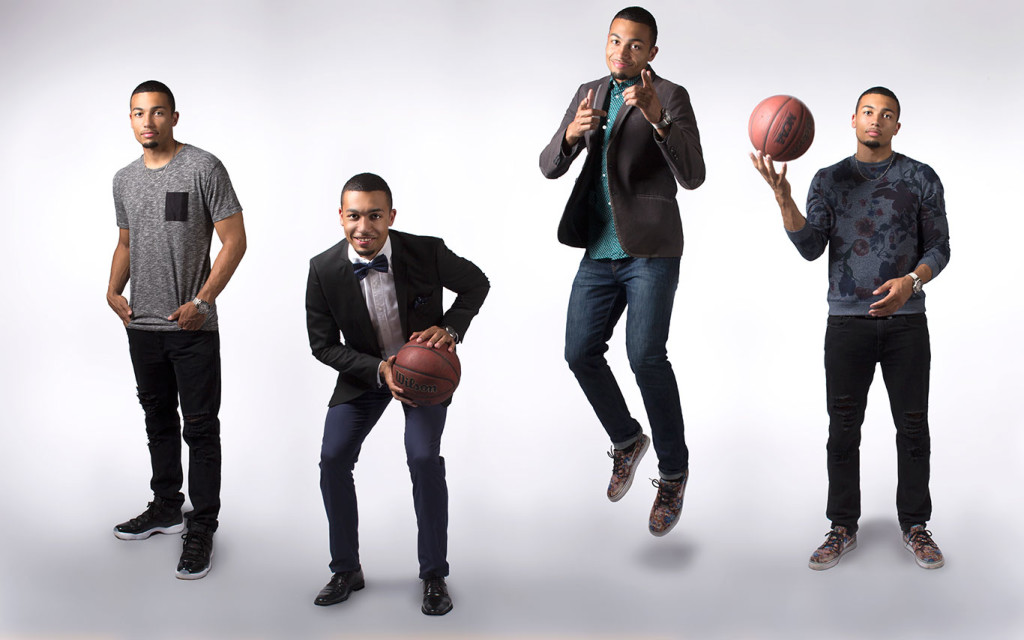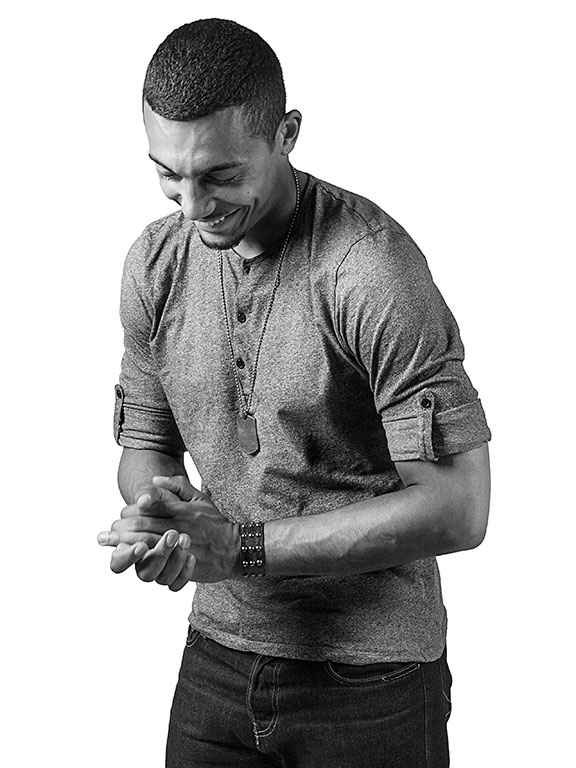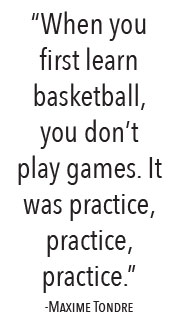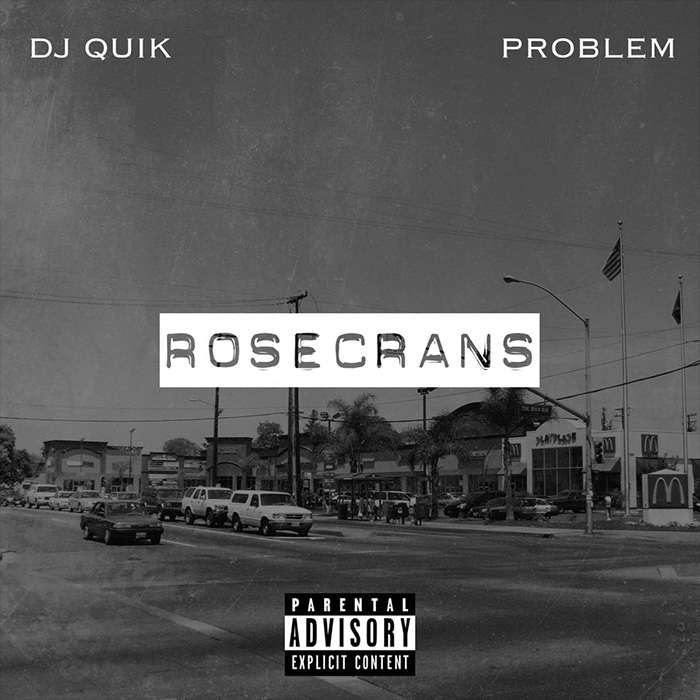The French Connection with Maxime Tondre

Maxime Tondre (Vidal Espina/Logos)
At first glance, Maxime Tondre looks like your average all-American college basketball player.
It isn’t until you listen to this mature 23 year-old and hear his deep voice encapsulated in an accent you would want to listen to all day, that you realize he is more than your average college student, he is a man of many worlds.
Tondre was born in Avignon, a little city in the south of France. His mother, a secretary and soon-to-be-mother of a first-born child, sought the assistance of her sister and brother-in-law, both doctors, to help Tondre come into this world. From there, Tondre’s mother brought him to the City of Lights, Paris, to raise him.
Growing up, Tondre had a normal childhood, well, normal for a child raised by a single, working parent. During the regular school season, he could be found in a classroom or on the playground , but two months out of the year, Tondre would spend his summer at his grandparent’s house. “My grandparents lived about five hours away from the city. It was a change of landscape and I loved it there,” Tondre said. It was at his grandparents’ home where he first was introduced to the English Language by his grandmother, “My grandmother was in England during the second world war. She was fluent in French, English and German.” Tondre jokingly makes an excuse about his disinterest in the German language, “She tried to teach my cousins and I English and German. My cousins got German but I was ‘allergic’,” he laughs.
In the third grade, Tondre convinced his mom to let him join basketball. “I was like, ‘I love basketball! Please, let me try it mom,’” Tondre remembers convincing his mom to let him play with his friends already on the team. But, soon afterwards he had become disillusioned.
“When you first learn basketball, you don’t play games. It was practice, practice, practice. We never got to play games.”
It wasn’t until middle school when Tondre’s love of basketball was rekindled by his friends. “I was younger than everyone, but I was taller,”Tondre said, “so my friends kept telling me ‘You know, the city club is very good. It’d be nice if you could come play with us.” After some short consideration, Tondre tried out and made the team.
It wasn’t long before the world of basketball embraced Tondre. Starting out in the city team, Tondre’s natural talent for the game propelled him into the bigger leagues. A national league coach spotted Tondre at a basketball summer camp.

(photo by Vidal Espina/Logos)
“The coach approached me and asked me ‘Where are you playing right now?’ I told him I was just playing my city club,” said Tondre. Feeling the sense of urgency in the coach’s voice, Tondre remembers him saying, “What? No, we’re going to call people for you.” It was as simple as a coach being able to spot natural talent that allowed Tondre to play on France’s under-16 national stage. “It was a good experience. It was then when I fell in love with the sport. Now I don’t see myself not playing [basketball].”
That would not be the first of breakout experiences. As a freshman in high school, Tondre was approached by a French recruiter with an opportunity that he couldn’t resist; an opportunity to come the United States. Tondre said, “He told me, ‘Go to the U.S. It’s a great opportunity. You can combine school and basketball.’ Which, when you’re playing at the national level is not really the case.” Tondre said., “When you play at a high level, it’s so time consuming that most people stop school altogether. Basketball teams are mostly done through private clubs, it’s not like in the U.S. where you have high school and college teams.”
With the prospect of being able to get an education and be able to play basketball, Tondre was sold. He just had to sell it to his mother, “Well, at first she asked, ‘How’s it going to work. Explain it to me.’” And reminiscent of the time he convinced his mother in the third grade he replied, “I just wanna go.” She was not convinced. So Tondre, unable to shake the possibility of living in the U.S., created a logistical plan on how he would make it work.
With his new plan and realizing how passionate Tondre was about this prospect, his mother gave her blessing. “She’s always been supportive. She was always pushing me to do the best things. She would never hold me back from pursuing the things I desired,” Tondre said about his mother. And so, Tondre started his senior year at a private high school in Indiana.
Tondre was in a whole new world here in America. Although American culture heavily influences pop-culture in Paris, Tondre still felt the culture shock.
“It’s a lot harder to get close to people here, like establishing a lasting friendship, compared to how it is in France,” Tondre said. That wasn’t the only cultural shock. Even in the sport he loves, the cultural approach on how to get into college basketball was different, “I thought I just needed to get good grades in high school, like in France.” But luckily Tondre’s coaches in Indiana helped him out, “They explained how things worked, like the kind of work ethic colleges are looking for and other requirements like good grades and good SAT/ACT scores. I had no idea.”
Not wanting to give up on the dream of continuing his education in the U.S., Tondre enrolled in a prep school. It was there he spent a year getting college-ready, both in and out of the classroom. His prep school also had a basketball team and it was there that Tondre was seen for the college he was to attend next.
Tondre attended Pensacola Christian College for one year, but discovered that it was an unaccredited college after hearing that a close friend had been denied acceptance into a Master’s program for not having a Bachelor’s degree from an accredited school. Tondre did not want to risk his future prospects of getting a higher degree.
“The idea of coming to the U.S. to get a college degree was to get an edge over someone else who has the same diploma in France.” But, having known someone who was having trouble with his diploma from an unaccredited school, Tondre continues, “Then I definitely did not want that to happen to me.” So, Tondre was on a search for a college that was accredited and had a basketball program where he could play.
That search led him to Citrus College. While in Florida, a few French friends suggested Tondre get in touch with a basketball coach in Riverside, California. That coach only coached a females only basketball team; however, he did know a coach at Citrus. A tryout was scheduled in May of 2014 and Tondre made the team.
Tondre is majoring in business and will be graduating this spring. As an international student, there are limited resources that would help him further his education. During his college career at Citrus, Tondre has spent summers back in Paris, working to save money for the upcoming semesters, as well as working on campus in the Outreach program. However, tuition fees at the university level are exorbitantly more than at the community college level, so there are only a handful of scholarships that will be able to cover that cost. Tondre has applied for U.S. government’s Diversity Visa Program, which if granted, would allow Tondre to have access to additional scholarships only available to publicly funded universities. UC Berkeley is one of those universities and where Tondre has applied for his Bachelor’s.
Holding steadfast to his goal of completing a higher degree here in the U.S., Tondre’s contingency plan, should transferring be postponed, is to go back to France to play semi-professional basketball. With his earnings from playing semi-pro basketball, Tondre will come back to the U.S. to finish his degree.
Tondre’s ultimate plan is to enter the world of entrepreneurship. “I have different ideas on businesses to start,” Tondre said. “One would be a business that helps French students and athletes with scholarships and advising. It can be tricky for international students to go through the paperwork process.” Tondre already does something similar in Paris, volunteering during the summer at Frenchy Associates. An organization dedicated to helping French student athletes make the transition from France to America.
Tondre is not only big in stature but he is big in work ethic, big in heart, and big in dreams, “Growing up as a kid I always wanted to do something big! I wanted to do something not many people have done before. I want to do it to influence people.”



